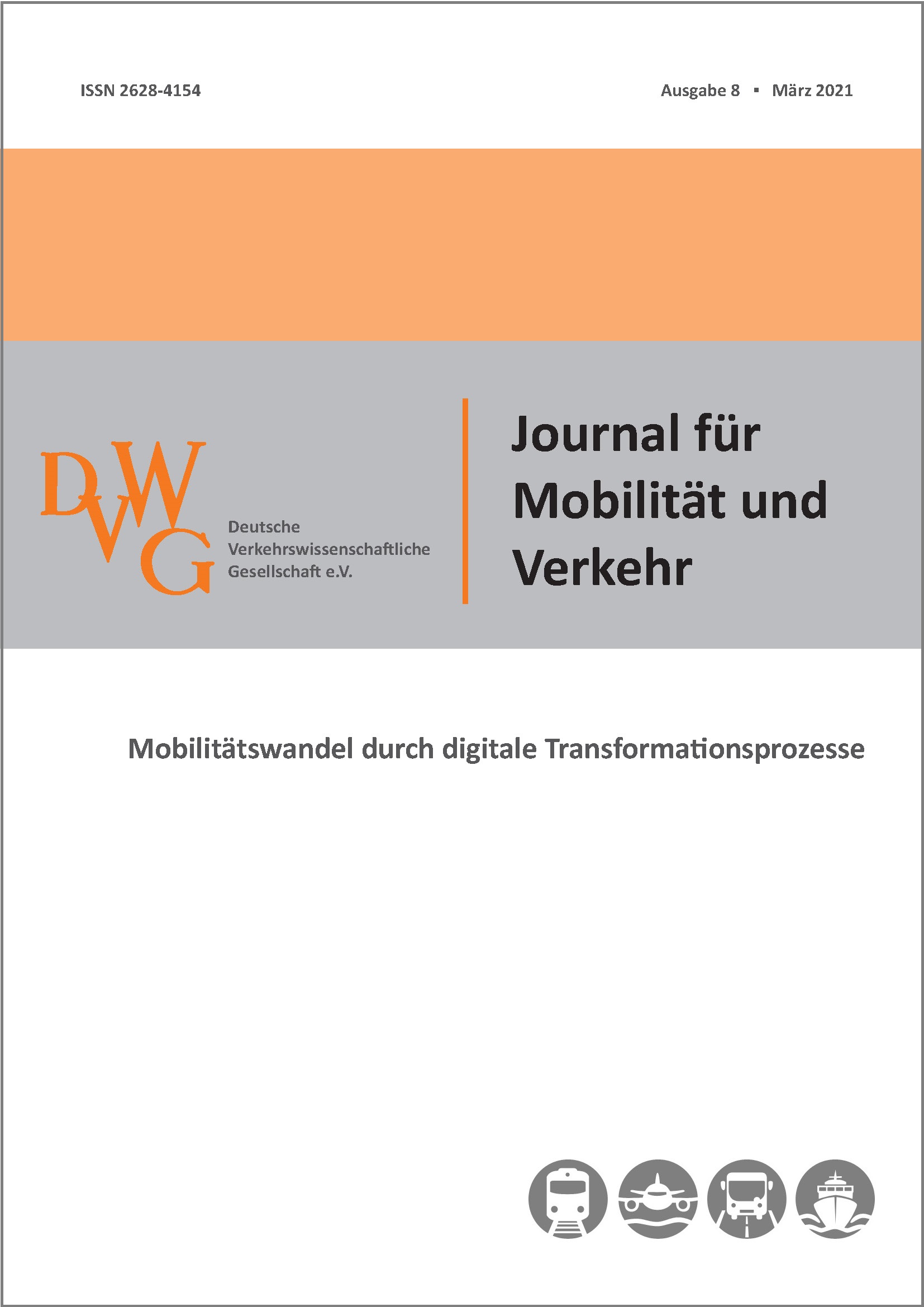Rentabilität und Wettbewerbsfähigkeit einer Robotaxi Flotte – Eine makroskopische Verkehrssimulation in der Stadt Zürich
DOI:
https://doi.org/10.34647/jmv.nr8.id51Schlagworte:
Autonomes Fahren, Flottenanbieter, Robotaxi, makroskopische VerkehrssimulationAbstract
Um die Vorteile von Robotaxis im urbanen Raum zu realisieren, muss die Profitabilität des Service gewährleistet sein. Dieser
Artikel untersucht das Preisniveau mit Hilfe einer makroskopischen Verkehrssimulation in Zürich. Um die finanzielle Rentabilität
zu ermitteln, werden die Simulationsergebnisse mit einer umfangreichen Kostenanalyse kombiniert. Die Ergebnisse zeigen,
dass Fahrten für 0,32 bis 0,42 CHF pro Kilometer angeboten werden können und sich Robotaxis bei entsprechender Auslastung
voraussichtlich unter dem Preisniveau vieler herkömmlicher Mobilitätslösungen etablieren.
Literaturhinweise
Regionalstatistik Lauenburg/Elbe. Stand 31.12.2019, Statistikamt Nord, 2019
Schäfer, M. & Keppler, D.: Modelle der technikorientierten Akzeptanzforschung. Überblick und Reflexion am Beispiel eines Forschungsprojekts zur Implementierung innovativer technischer Energieeffizienz-Maßnahmen, Technische Universität Berlin Discussion Paper. Berlin 2013
Christie, D. et al.: Pioneering Driverless Electric Vehicles in Europe: The City Automated Transport System (CATS). Transportation Research Procedia 13 (2016), S. 30-39
https://doi.org/10.1016/j.trpro.2016.05.004
Portouli, E. et al.: Public attitudes towards autonomous mini buses operating in real conditions in a Hellenic city. IEEE Intelligent Vehicles Symposium (IV). Piscataway, NJ: IEEE 2017, S. 571-576
https://doi.org/10.1109/IVS.2017.7995779
Wicki, M. & Bernauer, T.: Public Opinion on Route 12: Interim report on the first survey on the pilot experiment of an automated bus service in Neuhausen am Rheinfall. ISTP Paper Series 3 (2018)
Wicki, M. & Bernauer, T.: Public Opinion on Route 12. ISTP Paper Series 5 (2020)
Pakusch, C. & Bossauer, P.: User Acceptance of Fully Autonomous Public Transport. Proceedings of the 14th International Joint Conference on e-Business and Telecommunications. ICETE, Bd. 2. 2017, S. 52-60
https://doi.org/10.5220/0006472900520060
Nordhoff, S. et al.: User acceptance of automated shuttles in Berlin-Schöneberg: A questionnaire study. Transportation Research Part F: Traffic Psychology and Behaviour 58 (2018), S. 843-854
https://doi.org/10.1016/j.trf.2018.06.024
Kostorz, N. et al.: Automatisierte Kleinbusse im Öffentlichen Personennahverkehr - Akzeptanz und Nutzungsintentionen in Deutschland. Journal für Mobilität und Verkehr (2019) 2, S. 23-32
https://doi.org/10.34647/jmv.nr2.id14
Rauh, J. et al.: Empirische Beobachtungen zur Akzeptanz des Pilotprojektes "Autonom fahrender Kleinbus" unter den Bürgerinnen von Bad Birnbach. In: Riener, A., Appel, A. u. Dorner, W. (Hrsg.): Autonome Shuttlebusse im ÖPNV. Analysen und Bewertungen zum Fallbeispiel Bad Birnbach aus technischer, gesellschaftlicher und planerischer Sicht. Berlin: Springer 2020, S. 159-176
https://doi.org/10.1007/978-3-662-59406-3_9
Davis, F. D.: Perceived Usefulness, Perceived Ease of Use, and User Acceptance of Information Technology. MIS Quarterly 13 (1989) 3, S. 319-340
https://doi.org/10.2307/249008
Venkatesh, V. et al.: User Acceptance of Information Technology: Toward a Unified View. MIS Quarterly 27 (2003) 3, S. 425
https://doi.org/10.2307/30036540
Venkatesh, V. et al.: Consumer Acceptance and Use of Information Technology: Extending the Unified Theory of Acceptance and Use of Technology. MIS Quarterly 36 (2012) 1, S. 157
https://doi.org/10.2307/41410412
Madigan, R. et al.: Acceptance of Automated Road Transport Systems (ARTS): An Adaptation of the UTAUT Model. Transportation Research Procedia 14 (2016), S. 2217- 2226
https://doi.org/10.1016/j.trpro.2016.05.237
Madigan, R. et al.: What influences the decision to use automated public transport? Using UTAUT to understand public acceptance of automated road transport systems. Transportation Research Part F: Traffic Psychology and Behaviour 50 (2017), S. 55-64
https://doi.org/10.1016/j.trf.2017.07.007
Nordhoff, S. et al.: User acceptance of driverless shuttles running in an open and mixed traffic environment. Proceedings of the 12th ITS European Congress: ITS Beyong Borders. 2017
Nordhoff, S. et al.: Interrelationships among predictors of automated vehicle acceptance: A structural equation modelling approach. Theoretical Issues in Ergonomics Science (2020), S. 1-26
https://doi.org/10.1080/1463922X.2020.1814446
Nordhoff, S. et al: A structural equation modeling approach for the acceptance of driverless automated shuttles based on constructs from the Unified Theory of Acceptance and Use of Technology and the Diffusion of Innovation Theory. Transportation Research Part F: Traffic Psychology and Behaviour 78 (2021), S. 58-73
https://doi.org/10.1016/j.trf.2021.01.001
Lucke, D.: Akzeptanz. Legitimität in der "Abstimmungsgesellschaft". Wiesbaden, s.l.: VS Verlag für Sozialwissenschaften 1995
Kollmann, T.: Akzeptanz innovativer Nutzungsgüter und -systeme. Konsequenzen für die Einführung von Telekommunikations- und Multimediasystemen. Neue betriebswirtschaftliche Forschung, Bd. 239. Wiesbaden, s.l.: Gabler Verlag 1998
Ergebnisse des Zensus 2011, Statistische Ämter des Bundes und der Länder
Alessandrini, A. et al.: Investigating users' attitudes towards conventional and automated buses in twelve European cities. International journal of transport economics 43 (2016) 4, S. 413-436
Soe, R.-M. & Müür, J.: Mobility Acceptance Factors of an Automated Shuttle Bus Last-Mile Service. Sustainability 12 (2020) 13, S. 5469
https://doi.org/10.3390/su12135469
Salonen, A. & Haavisto, N.: Towards Autonomous Transportation. Passengers' Experiences, Perceptions and Feelings in a Driverless Shuttle Bus in Finland. Sustainability 11 (2019) 3, S. 588
https://doi.org/10.3390/su11030588
Wintersberger, P. et al.: Man vs. Machine: Comparing a Fully Automated Bus Shuttle with a Manually Driven Group Taxi in a Field Study. AutomotiveUI '18: Adjunct Proceedings of the 10th International Conference on Automotive User Interfaces and Interactive Vehicular Applications. New York, USA: ACM Press 2018, S. 215-220
https://doi.org/10.1145/3239092.3265969
Schoettle, B. & Sivak, M.: A survey of public opinion about connected vehicles in the U.S., the U.K., and Australia. 2014 International Conference on Connected Vehicles and Expo (ICCVE). Piscataway, NJ: IEEE 2014, S. 687-692
https://doi.org/10.1109/ICCVE.2014.7297637
Piao, J. et al.: An assessment of user acceptance of intelligent speed adaptation systems. Proceedings of the 8th International IEEE Conference on Intelligent Transportation Systems. Piscataway, NJ: IEEE 2005, S. 1045-1049
Dong, X. et al.: Transit user perceptions of driverless buses. Transportation 46 (2019) 1, S. 35-50

Downloads
Veröffentlicht
Ausgabe
Rubrik
Lizenz
Copyright (c) 2021 Maximilian Richter, Johannes Hess

Dieses Werk steht unter der Lizenz Creative Commons Namensnennung - Nicht-kommerziell - Keine Bearbeitungen 4.0 International.

